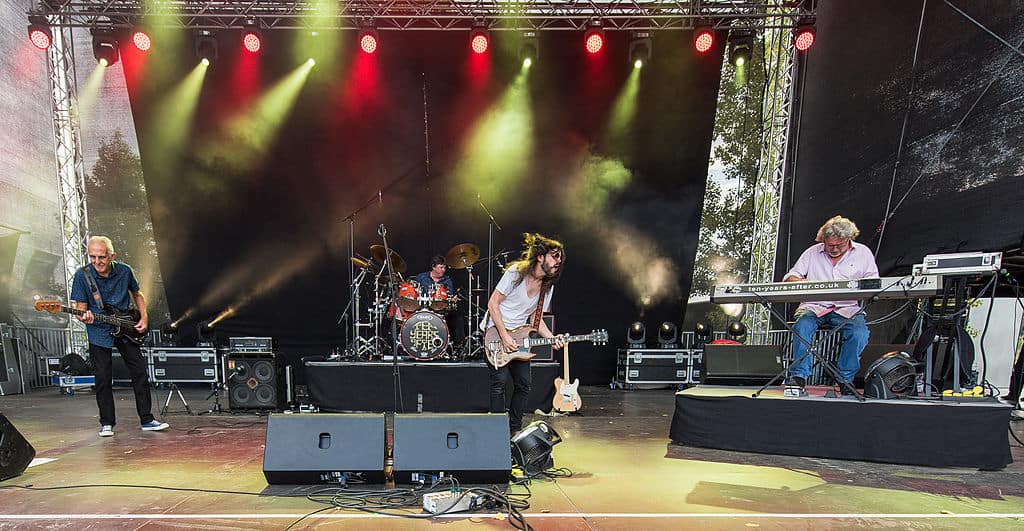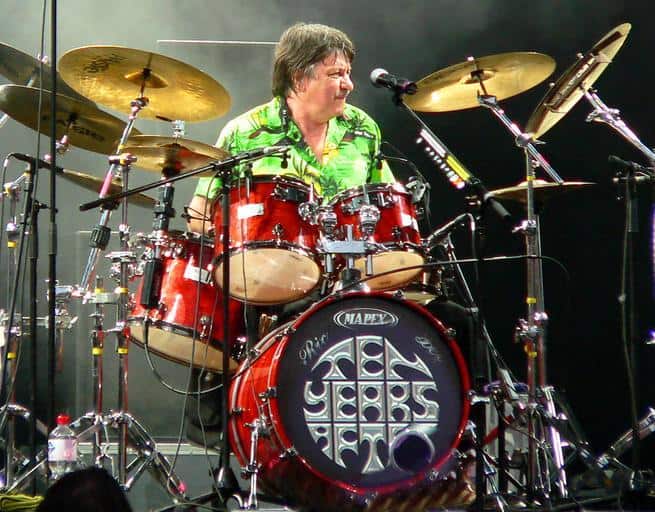If you can remember anything about the sixties, you weren’t really there
– Paul Kantner
Paul Kantner’s sentiment may have been earnest and well-meaning, but it simply wasn’t and isn’t true. The Jefferson Airplane guitarist might not have remembered much about the sixties and the part he played in helping to shape it.
The majority of the innovators and heavyweights who became a catalyst for change during that tumultuous period still recall every obstacle they were forced to overcome and the rewards, both personal and financial that accompanied their dogged determination to transform the world.

Change is never easy, and it needs a lightning rod to draw people to it, something to inspire them and give them hope, something that acts as a clarion call to be better, do more, and help others to rally to the cause. And in the nineteen sixties, the rallying cry was music.
The spiritual home and birthplace of the sixties counterculture and revolutionary movement and the point at which the musicians who felt its lure began to diverge after initially being drawn there, San Francisco was about as far removed from the normally sedate and everyday towns in Britain as it was geographically, and socially able to be.
In The Beginning
England didn’t fall under the thrall of hippie ideals in quite the same way that America did. It wasn’t immersed in a war that its citizens didn’t understand, wasn’t being forced to alter its nationwide course for a better destination by the civil rights movement, and was still desperately trying to recover from the rapid three punch economic knockout of the Second World War, the Korean War, and the Suez Crisis.
Unswayed by the evolution of the world around it, England was still dreaming of the days of Empire and colonialism and wasn’t prepared for the decade that would alter the destiny of the world. And as unprepared as the country as a whole was, that paled in comparison to how unprepared the rural and urban communities of the Midlands were for what was heading their way.
But music has an uncanny ability to seep through the cracks of the defenses that the world and those terrified by its underlying power to usurp and rearrange their neat prim and proper version of reality fortify their own little corners of the globe with.
As hard as they tried though, the old guard in Ric Lee’s home town of Mansfield, Nottinghamshire couldn’t prevent rock and roll from making its presence felt, and just as they had in London, Liverpool, Manchester, and Birmingham, the teenagers of the small English town fell under its spell.
The Pied Piper came calling with his electric guitar, and the youth of the area willingly followed his lead, without thinking about the consequences their parents desperately tried to warn them about or caring where it might end up leading them.
And nestled among the ranks of children, teenagers, and delinquents swept up by the wild new music from America, was Ric Lee, a man whose own journeys would take him far beyond the shores of his homeland, to places undreamed of where he would meet, play with, and join the ranks of the men and women taking the pulse and curing the ills and woes of the nineteen sixties with their music.
The Early Years
Born on the 20th October 1945, Ric Lee spent the early years of his life chasing the same girl and indulging in the same ribald pastimes and pleasures as the rest of his friends and schoolmates did.
Life was far simpler in the nineteen forties and fifties, and you made the most of whatever came your way, whenever it came your way, two lessons that Ric learned at a young age. Ric took the lessons that growing up in Mansfield had taught him to heart and throughout his long and illustrious career, they’ve served him well.
After falling in love with music, Ric began playing drums while in high school, and just like every drummer before and after him it wasn’t long before he joined his first band.
The Falcons, comprised of Ric and two of his school friends served as his calling card and it wasn’t long before other, more well-known, and established bands began to pay interest in the fledgling drummers career, which meant that his tenure in the band that had formed with his friends, would be short, but sweet.
Ricky Storm and the Stormcats, a working band from the local area who had earned their reputation the hard way had decided that they wanted Ric to be their drummer, and after being persuaded that he needed to flex his playing muscles and the best way to do that was with Ricky and the boys, he signed on the dotted line and became a fully-fledged, time served Stormcat.
It was while playing with Ricky Storm and the Stormcats that Ric first crossed paths, and became friends with Dave Quickmire, the drummer for one of Nottingham’s best-known and biggest, at the time, bands, The Jaybirds. Ric and Dave soon gelled and started jamming and playing together as often as they could, whenever they could.
During these furious sessions, the elder statesman of the Nottinghamshire rock and roll scene began to teach Dave everything that he knew, and being an ever willing and observant quick study, Ric began to incorporate the chops that he was learning into his own playing style.
The more he learned, the better he became and gradually the master realized that it was time to pass his mantle on to his student. Dave had become slightly disenfranchised by the life of a working musician, and when he decided to get married, saw it as the perfect opportunity to step down from his position as a member of The Jaybirds and in nineteen sixty-five, Dave Quickmire offered the now vacant drummer position to his friend and former student, Ric.
It was a gig, and position, that Ric readily accepted little knowing how it would amend and modify the course of his life. Neither he nor his new bandmates Alvin Lee and Leo Lyons had any idea about the plans that fate was beginning to draw up for them.
The Jaybirds Make The Move
The Jaybirds soon realized that if they were going to go anywhere, they needed to move to the place where everything was happening, and in nineteen sixty-six, they packed their bags and left Mansfield and Nottinghamshire in their rearview mirror and headed for the bright lights of London.
Around the time that they made the move, their then road manager and piano prodigy Chick Churchill, at the behest of Alvin Lee who was looking for a way to expand and fill out the sound of the band, joined the Jaybirds as their keyboard player.
Shortly after arriving in London, The Jaybirds signed a management contract with Chris Wright, and feeling like the band was about to embark on a different chapter of their story, The Jaybirds changed their name to Blues Trip.
It was a change that didn’t stick, and the band bounced around under a few different monikers until using the name Blues Yard, they secured a support slot with The Bonzo Dog Doo-Dah Band at the infamous Marquee in London.
It was shortly after this show, that Leo Lyons and Alvin Lee had a revelation and changed the band’s name to the one that eventually stuck and propelled them to the dizzying heights of fame and fortune.
Ten Years After
Despite the popular rock and roll myth that Leo Lyons found the band’s name in a magazine advert that was aimed at reminding the public that it had been ten years since the Suez Crisis, Ten Years After actually owe their name to the King of Rock and Roll , Elvis Presley.
Alvin Lee and Leo Lyons were huge Elvis fans and credited him as being their inspiration and the reason that they chose to follow a similar calling and become musicians. So it seemed fitting that the new name of their band would in some way reflect the role that Elvis had played in both of their lives.
Lyons and Lee settled on the name Ten Years After, as in nineteen sixty-six when they decided it was time to rename their band, it was a decade after Elvis’s most successful year and the one in which his fame spread from one corner of the globe to the other, nineteen fifty-six. And ten years after Elvis made his mark, Lyons and Lee decided it their turn to follow in the footsteps of their idol.
The First Time
With their new name, the band began to create their own mythology and legacy, unburdened by the chains of their prior life in Nottingham. As soon as they started playing, they began to attract the sort of attention that The Jaybirds hadn’t been able to, and Ten Years After became the first band to be signed by the agency that would later adopt the Chrysalis name, and were booked for a residency at The Marquee.
Just a few short months earlier, they’d struggled to get support slots at the club, but after changing their name and drifting toward a more blues-oriented sound, they’d been offered their very own residency. To all four members of the band, it felt like the world was their oyster.
The trouble with oysters though, is that one helping is never enough, and following their residency in the Marquee, Ten Years After were invited to play the Windsor Jazz Festival in nineteen sixty-seven, a performance that brought them to the attention of Decca Records, who immediately signed London’s hottest new blues act.
Later that year, they released their debut, self-titled album, which is widely regarded as being the first British Blues Rock record. For Ten Years After, it was all about the firsts.
I’m Going Home
Having laid the foundation that they needed to with their first album, nineteen sixty-eight saw Ten Years After finally leave the shores of their home country, and after releasing their second album, a live record called Undead that featured the first version of one of the songs that would later become synonymous with I’m Going Home, the band toured Scandinavia and America for the first time.
By the time nineteen sixty-nine rolled into view, Ten Years After were ready, and after releasing their second studio album Stonedhenge, they set sail for America again to play the Newport Jazz Festival and joined the touring package that the festival inspired and helped to put together.
Woodstock Bound
According to Ric Lee, when Ten Years After was originally asked to play Woodstock their management turned the offer down. The money wasn’t right and the band was pulling in great crowds playing with Nina Simone.
Then the buzz about the show in upstate New York, which was supposed to be the biggest the world had ever seen started to happen, and the bands began to sign.
First Jimi Hendrix agreed to play, then The Doors, Jefferson Airplane and The Who signed. Ten Years After knew they had to play and readily agreed to be on the bill.
Ric figured that maybe, even given the ever-increasing word of mouth about Woodstock there would be maybe fifty or sixty thousand people at the festival, and wasn’t prepared for the four hundred thousand fans who did show up.
Nor was he, or any other member of the band prepared for the fact that the only way that they could get into the festival to play, and out again afterward, was by helicopter. The whole experience was unlike anything any of them had ever experienced before. And Ten Years After’s time at Woodstock didn’t end on that stage in New York.
After playing their set, Ten Years After were one of the bands from the festival who were chosen to appear in a film that documented the event, and the inclusion of their song I’m Going Home catapulted them to global fame.
It opened doors that they couldn’t have opened by themselves, and the next time they toured, instead of the larger clubs and medium-sized venues that they were used to playing, they were booked to play the Budokan,
The Forum, Madison Square Garden, and the Royal Albert Hall. Ten Years After had been handed the keys to the kingdom of rock and roll and for the second time in their career, it felt like the world was theirs for the taking.
Post Woodstock
In the years following Woodstock, Ten Years after adopted a punishing recording and touring schedule that saw them release their only UK hit, and the first record in history on which he A and B sides were deliberately designed to be played at different speeds, Love Like A Man in nineteen seventy and their biggest charting and selling single, I’d Love To Change The World in nineteen seventy-four.
After changing record labels, in nineteen seventy-one and finding a new home on Chrysalis and Columbia records and releasing five more albums (Sssshh, Cricklewood Green, Watt, A Space In Time, Rock and Roll Music To The World and Positive Vibrations) the pressure of living of being in a band that was hardly ever home, didn’t believe in downtime and was always busy finally took its toll, and in ninety seventy-four, Ten Years After called it quits, and the members went their separate ways.
We’re Putting The Band Back Together
After nine years apart, Ten Years After (mistiming things by a year), briefly reunited in nineteen eighty-three to play the Reading Festival and The Marquee’s Twenty-Fifth Anniversary, with Ric assuming full management responsibility as well as playing the drums for the band.
In his time away from the spotlight, Ric had launched his own Management, Publishing, and Production company, which had been responsible for releasing a top thirty UK single in nineteen seventy-seven and promoting a song that reached the finals of the Eurovision song contest in the same year.
The experience that he had accumulated in his years away from Ten Years After proved invaluable to the reunion, and having achieved everything they wanted to, once again the members of Ten Years After went their separate ways.
We’re Putting The Band Back Together (Again)
And then, in nineteen eighty-eight, Ten Years After got back together again, for the second and final time. This time the reunion stuck.
They recorded About Time and started touring again, and somehow the original line-up managed to stick it out together for nearly fifteen years before Alvin Lee was either asked to leave or left of his accord (depending on who you ask), in two thousand and three.
The subsequent bad feeling between both parties would endure until Lee’s premature death from complications during a routine surgical procedure in two thousand and thirteen.
Following Lee’s departure in two thousand and three, and having recruited Joe Gooch to replace him, the three original members of Ten Years After along with their new protege recorded and released Now and followed it with Evolution in two thousand and eight, which would be their last album for nearly ten years.
In two thousand and fourteen, long-time bass player and founding member Leo Lyons left Ten Years After, and three years after his departure, with the band’s new members, having finally been worked in and thoroughly steeped in the band’s way of doing things, Ten Years After recorded A Sting In The Tale their final studio album to date.
They continue to tour and play as many shows as they always have, which means that maybe one day when they can find the time in their increasingly busy schedule, they might get around to recording another record.

Life After Ten Years After
Ric Lee, as we mentioned earlier, learned at an incredibly young age to never let an opportunity pass him by, and since he first sat behind a kit when he was still in school, he’s never stopped playing. And in likelihood, he probably never will.
When John Bonham died in ninety eighty before they decided to end the band out of respect for their fallen comrade, Led Zeppelin considered replacing their whirlwind drummer with the only man capable of filling the large hole that he left in his wake, Ric Lee.
Having missed the Zeppelin gig, Ric instead joined the long-standing and incredibly popular UK blues institution Chicken Shack and settled back into doing what he loved to do, playing and recording.
In nineteen ninety-four during one of the incredibly brief periods when Ten Years After weren’t busy and having a blues-based itch that he needed to scratch, Ric formed The Breakers with his old comrade in arms and fellow die-hard road warrior, Ian Ellis, and together they recorded and released one album, Milan in nineteen ninety-five.
The band that Ric is most proud of, outside of his work with Ten Years After is the one that is closest to his heart and his pet project The Ric Lee Blues Project, or as it later became known Ric Lee’s Natural Born Swingers. Featuring members of Savoy Brown and The Animals, the band has so far issued one album, two thousand and twelve’s Put A Record On.
They remain active and while the membership is always changing, depending on who is available to play and when the band remain true to the core ethos of their founding member and guiding light, Ric Lee who rigidly adheres to his love of the blues and rock and roll and has made sure that he’s followed his heart and dreams since he first started pounding out a four rhythm for The Falcons at the beginning of the nineteen sixties.
There’s More To Ric Than Music
With a number of ambient albums under his belt, as well as the staggering discography that comes with fifty-five years of being a professional musician, Ric Lee has also recently added the accolade of author to his not inconsiderable skillset.
His first book, From Headstocks To Woodstock tells the story of his incredible life as only he can, and somewhere in between playing more shows than he can remember, writing his memoir, and recording, Ric found the time to get married and have a family, who he lives with in Derbyshire.
Some dreams really do come true.
Similar Stories…
- Duran Duran – 10 Best Songs
- Paul Kossoff – The Great Blues Guitarist That Got Away
- 3 Female Singers You’ve Probably Never Heard Of
- Squeeze – The Coolest of Cats
- The Alice Cooper Fact Sheet – 5 Things You Need To Know - January 12, 2023
- Everybody Knows The Words, But What Is Hotel California About? - April 29, 2022
- What Is The Meaning Of Stairway To Heaven: Led Zeppelin’s Amazing 1971 Musical Epic? - April 24, 2022


